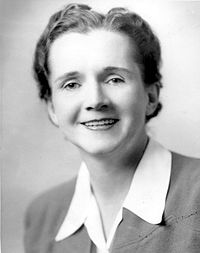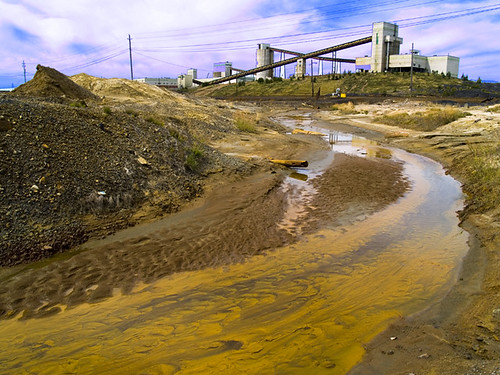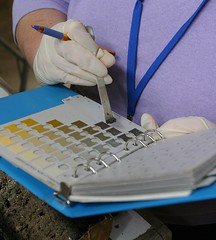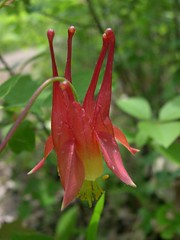Little newscast on a 2 way trip between 2 drivers. One driver using hypermiling techniques and the other not. What is the difference in trip time and gas costs?
Sphere: Related ContentSunday, November 30, 2008
Thursday, November 27, 2008
Monday, November 24, 2008
What Would Jesus Drive

The Evangelical Environmental Network asks some serious biblical questions on Christian responsibility and climate change - specifically around a responsibility to care for creation - Earth the original Garden.
Now that the Pope has named pollution as a sin it makes sense to consider what would Jesus drive?
Saturday, November 22, 2008
Rainbow Routes Adresses Sudbury's addiction to cars
Rainbow Routes AGM looked at Sudbury's unhealthy and polluting auto addiction and suggest that city planners encourage walking, biking and outdoor lifestyles.
Friday, November 21, 2008
Sunday November 30th 7 pm.-- Sudbury Soils: What’s the Risk?
Sunday November 30th 7 pm.-- Sudbury Soils: What’s the Risk?
Health of Sudburians Focus of Public Forum
Dr. Kapil Katter to Speak in Council Chambers November 30th
Dr. Kapil Katter's is the author of a report that found that Sudburians
health may be at risk as a result of soil contamination in the Sudbury
area. The forum will include presentations and a question and answer
session.
Dr. Kapil Katter's report was released by the Community Committee on
the Sudbury Soils Study last month. The report said that the Sudbury
Soil Study Human Health Risk Assessment Report (HHRA) underestimates
the degree of risk to local people and inappropriately makes
decisions about that risk that should be made by the community.
Dr. Katter will present his report in a public forum in the City of
Greater Sudbury Council Chambers in Tom Davies Square at 7 pm. on
Sunday November 30th. The forum will include presentations and a
question and answer session.
The review of the HHRA was commissioned by Mine Mill 598 and Local
6500 of the Steelworkers this summer and was released on October 22.
The Community Committee on the Sudbury Soil Study has been organized
in response to the soils studies and related risk assessments.
For more information, contact:
Rick Grylls, 705-673-3661
Sponsored by the Community Committee on the Sudbury Soils Study.
For more information email sudburysoils@onlink.net or call 673-3661
Wednesday, November 19, 2008
Monday, November 17, 2008
Green Economic Engine For Sudbury
Part of the 2003 Greater Sudbury Development Corporations Strategy for 2015. Dr. Dave Pearson on Green economic activity. Why does 2003 seem so far away?
Sunday, November 16, 2008
Saturday, November 15, 2008
Friends of Sweetman’s Garden
Friends of Sweetman’s Garden
For Immediate release: Friday, 14 November 2008
In September, 2007, North Bay City Council authorized conversations with representatives of Sweetman’s Garden to purchase this beautiful west end neighbourhood property. Many in our community breathed a sigh of relief that this special place had been “saved.” Not so. City residents learned on November 5, 2008 that a significant portion of the garden is slated for a new North Bay Hydro Sub-Station.
This Council decision will destroy the garden’s unique character. Although The Nugget reported the Sub-Station would be on land adjacent to this “beloved neighbourhood garden,” the Mayor indicated on his Cogeco TV call-in show on November 7 that it will intrude into the garden, more than 20 feet as it turns out. The project means the removal of all trees as well as the stone wall on the North/West boundary, and the destruction of several perennial gardens running parallel to that line. A lovely view that frames the whole end of the site will be gutted.
The result is a profound loss of the garden’s historic significance and the beauty and sanctuary that help make this particular neighbourhood so special to so many.
Friends of Sweetman’s Garden have made every effort to encourage a positive resolution in this matter. An agreement seemed close. We were therefore stunned to discover - through the media - that negotiations entered into in good faith were now suddenly being ignored by the City.
Our hope is that we can continue to work cooperatively with Hydro and the City to find a better way for everyone’s interests. We have always shared with City Council many of its stated hopes for this community. From the City website, for example: “The combination of lush forests, spring-fed water and clean air creates a healthy environment for working, living and raising a family. Safe, friendly, well-planned neighbourhoods also make coming home a pleasure in North Bay.” We also affirm the City’s efforts to put North Bay on a firm financial basis. But we have difficulty when the principles of healthy neighbourhoods that the City advocates in its Official Plan and the emerging uPlan are ignored in this instance.
The Hydro project proposed for the garden deeply, negatively, transforms it. A recent (draft) Parks Plan noted that the city’s west end is under-serviced in terms of parks. This garden, historically unique in Northern Ontario, is an obvious “green” asset. But steel structures, high-voltage lines and a chain link fence replacing what is now a treed, quiet residential area around the site will compromise the beauty cherished by dozens of school classes, bus tours, weddings and individuals, by the many volunteers who help Murray Sweetman maintain it, and by the children who play in what they call “the secret garden.”
This whole matter will be of a wider concern in a city which publicly expresses its desire to preserve all its beautiful neighbourhoods. In recent months some major companies in our city have stated their efforts to recruit and retain employees are enhanced by the quality of life here. Our hope is that North Bay neighbourhoods, including Pinewood where this garden is a special feature, one that is beloved by many around it and beyond, will be treated as places of great beauty, and not just as intersections and industrial sites.
For further info, and images from the garden: www.sweetmansgarden.com
Jim Sinclair, Spokesperson(705) 472-5849 Sphere: Related Content
Wednesday, November 12, 2008
Sudbury backs out of windfarm in 2004
COPYRIGHT 2004 Laurentian Business Publishing, Inc.
The proposed 54-megawatt MacLean Mountain site just south of Little Current is one of the most advanced wind power projects in Ontario, but Sudbury Mayor Dave Courtemanche believes the city can make better headway in the wind energy market with projects closer to home.
"This particular initiative fell outside our boundaries and council was not comfortable making that kind of investment in a project outside city boundaries."
Council reached the decision during this past spring's budget talks in a closed-door session.
The $97-million Little Current project, which is currently undergoing a provincial environmental assessment, is expected to be operational by summer 2005.
The project's details were slated to be laid out during a June 30 public information session in Little Current.
Sudbury's financial commitment in the project was to have included grant money secured from the Federation of Canadian Municipalities green energy fund.
Courtemanche says the funds could be better spent on other eco-industry initiatives such as the biodiesel program and a Sudbury-based wind farm.
"I think the wind capacity here is good enough that it's worth exploring and looking for partners who want to pursue that locally," says Courtemanche, adding it is a "great opportunity" to explore possibilities with local industry, such as mining giants Inco and Falconbridge "who could really benefit from this type of project."
In October 2002 Sudbury selected Northland Power from 20 proposals submitted from some major electricity generation and wind-power developers in North America and Europe.
"Council will work on other energy projects and certainly feeling it is likely to be a different outcome for projects within our political boundaries," adds Paul Graham, the city's plant engineer and a project lead in the Earthcare Sudbury green energy initiative.
Graham says the city remains in a partnership with Northland Power, looking at opportunities within Sudbury's political boundaries. Sudbury continues to work with Northland on a wind assessment study, comparing data from the city's monitoring sites with other "surrogate sites" such as the Sudbury Airport, which has wind records dating back to 1954, to allow them to do a better job in long-range forecasting.
The city is looking for possible land arrangements for a wind farm, and is finalizing the business plan to identify what is needed from a power-purchase point of view.
Graham would not confirm if the City of Ottawa has swooped in and signed a partnership agreement with Northland to develop the MacLean Mountain site.
By IAN ROSS
Northern Ontario Business
Monday, November 10, 2008
A open letter to local food producers and gardeners
A open letter to local food producers and gardeners
from
The Community Committee on the Sudbury Soils Study
Tuesday, November 11th 2008
The Community Committee on the Sudbury Soils Study is writing to clarify some misconceptions regarding our position on the production and consumption of local food.
All our members strongly support growing a strong and vibrant local food economy in the Greater Sudbury area. There are many benefits to eating locally:
- · Consumers can develop a relationship with local producers that we can’t with foods imported from outside the region
- · That relationship allows us to inform ourselves about the way the food is grown
- · The ecological footprint of local producers is much smaller than that of multinational corporations
- · We are supporting local jobs and contributing to the local economy
- · We are enhancing our ability to feed ourselves, and to decrease our dependence on outside food sources.
We would rather eat food grown safely by local producers than supermarket foods. When food comes from the supermarket, we rarely know the conditions under which it has been grown, how far it has traveled, or how the people growing and harvesting it have been treated. From an environmental perspective, supermarkets often have the additional environmental burdens of extra packaging and the increased use of fossil fuels for long distance shipping.
When the results of food-based studies that formed part of the Sudbury Soil Study were released (the Market Basket Daily Intake and the Vegetable Garden Survey) , we discovered that the levels of some metals in the supermarket foods most of us buy were sometimes high enough to put the health of our families at risk.
However, the report on vegetable gardens in the Sudbury area showed that for some gardens, these metal levels were also high, most likely due to smelter emissions. Although only 70 samples were taken, and usually only one sample per property, there was enough evidence to warrant more sampling and analysis being done.
When it came to commercial food operations in the region, only 20 samples were taken from a total of 15 properties.
We don’t think that is enough testing to draw any conclusions. It can’t reassure those of us who produce food for our families and others, nor those who eat it. We support the desire of local food producers to have their food and soil tested.
Dr. Khatter felt that there was enough evidence when it came to vegetable gardens in some parts of the City that real caution should be exercised.
The Committee agrees with him, and wants to work with local producers and gardeners to find out if there are some places that will need remediation before health-giving fruits and vegetables can be grown. We think the costs of that remediation should be borne by the mining companies and by the government that allowed this to happen. In the event that remediation should not be possible, fair compensation should be paid.
The Community Committee on the Sudbury Soils Study came together this summer as result of public concerns with the process and findings of the Sudbury Soil Study Human Health Risk Assessment.
The purposes of the Committee are:
* To ensure that the Sudbury public has access to the necessary information to determine whether they wish to give their informed consent to the risks to the environment and human health from historic and current mining and smelter activities, and can determine effective responses to these risks.
* To move the Ontario Government and its agencies to respond effectively to the Sudbury Soil Study findings. This response must ensure that contamination from mines and smelters in the Sudbury region is properly identified, remediated and (where it cannot be remediated) contained, and that those whose health might be affected (or may be affected) by contamination are provided with diagnosis, treatment and (where this is not possible) with compensation.
Our concerns with the Human Health Risk Assessment, and with the Sudbury Soils Study in general, focus primarily on the fact that there has been little opportunity for the public to educate itself on or to provide input into the research process. Nor has there been opportunity for our community to decide for ourselves the risk we are willing to live –those decisions have been made for us.
We regret that, while the community committee has been working on ensuring Sudburian’s health and safety, the headlines in the local media last week drifted off the key points addressed in the Environmental Defence Report, (www.toxicnation.com), and placed local food producers in the eye of the storm .
The focus needs to shift back to where it belongs, which is on the Soils Study and on the need for open public debate on the concerns that our community might have.
Let’s work together to build a local food system we can rely on in the Greater Sudbury Area.
Respectfully,
Joan Kuyek, Chair
On behalf of the
Community Committee on the Soils Study
c/o Rick Grylls, 19 Regent Street, Sudbury ON P3B 4B7
Sphere: Related Content
Sunday, November 9, 2008
Meet the Mother of the Environmental Movement -Rachel Carson

Rachel Carson wrote was is considered to be the first Green manifesto entitled Silent Spring in 1962 and helped launch eco-feminist thought into the mainstream. The book quickly became a huge bestseller on the effects of the pesticide spraying of DDT by farmers and Govt. agencies in the U.S
She began writing on water issues after working for the U.S. Dept. of Fisheries and helped to bring together conservationists, naturalists and scientists long before an ecology movement had a name.
Eventually, Rachel Carson, the biologist brought her zoology and genetic scientific research skills to the documenting and investigation of bird populations and the effects of man made chemicals in the environment to a public anxiously in the midst of above ground nuclear testing.
Her book Silent Spring was met with concerted industry attacks and was quoted in the Congress and by Presidents. The book helped to ban domestic use of DDT and she is credited with the creation of the E.P.A. , Environmental Defence Fund.
For a longer bio read the Wikipedia entry
Saturday, November 8, 2008
Friday, November 7, 2008
Wednesday, November 5, 2008
Tuesday, November 4, 2008
VALE/INCO applies for permit to take 1 million liters of water a day for 10 years

I know the Ministry of Environment application says this Vale/Inco application for permit to take water is for groundwater remediation but that's still a lot of water. What is being remediated anyways? and for 10 years how will this effect aquifers and water tables etc.
I think GroundWater remediation sounds like a really good thing but following so close to the SARA (Sudbury Soils Study Assessment) response and the recent public meeting on INCO's application for an exception to the 2010 pollution guidelines I though asking for 800,000 liters of water was a bit much. Perhaps this is cause for another public consultation? or at least more information
Here is the Ontario Government info on the Permits to take water process including Green Facts classification system and water conservation requirements etc.
Sunday, November 2, 2008
GreenDrinks Tuesday Nov 21st

Another installment of the local chapter of GreenDrinks occurs this Tuesday Nov 21st at 7:30 at the Little Montreal Cafe on Elgin street Come on out for a social evening of ideas, group updates and networking to help Get Charged for the next big Green Thing.
What the next big Green Thing is up to all of us but here is one idea to chew over a GreenSalon!
Engaging panel discussion/debate with Q and A focusing on our local smarties and Green Groups with maybe some music/art/food etc. Kind of like GreenDrinks with more discussion and set topics and speakers? Like an ideafactory or brainbank!
Here's some links to what I mean
Ignite . 10 speakers @ 5 minutes with powerpoints.
IDEACITY -Canada's Premier Meeting of The Minds
TED conference ( Idea's worth spreading)




